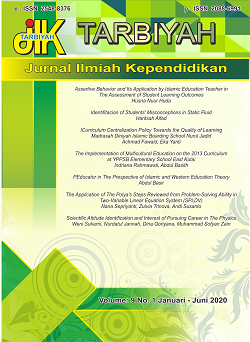Educator in The Prespective of Islamic and Western Education Theory
DOI:
https://doi.org/10.18592/tarbiyah.v9i1.3471Abstract
Educators take as an important rule in educational system. They are the ones who are responsible for the students in achieving their educational goals. Basically, there is no difference concept of educators in both Islamic and Western Education. However, Islam has broader perspectives compared to the Western one, since in Islam Allah is believed as the first and foremost teacher or educator. Then, this is continued by the Prophet Muhammad as a recipient of revelations from Allah, and then it is inherited to the Islamic Scholars and even parents to educate their followers, children, and all family members. The position of educators is highly appreciated according to Islamic Education, since the source of the knowledge taught to the human is directly from Allah the Almighty God. Therefore, the nature of educators should become role models which can be taken as a good example for the students in order to improve the quality of theit faith and piety. Thus, the terms and conditions for an educator are s/he must be an adult, has good personality and character, has broaden knowledge and skills, and also good attitudes and consistency based on Islamic taughts.References
‘Athiyah, a.-A. M. (1969). At-Tarbiyah al-Islamiyah wa Falasifatuha. Beirut: Dar al-Fikr.
A.M., S. (2010). Interaksi dan Motivasi Belajar Mengajar. (Jakarta: PT. RajaGrafindo Persada.
al-Abrasyi, M. A. (1975). Muhammad AthiyAl-Tarbiyah al-Islámiyah wa Falãs!fatuha. Mesir: Isa al-Babi al-Halabi.
Al-Attas, S. M.-N. (1980). The Concept Of Education in Islam. Kuala Lumpur: Muslim Youth Men Of Malaysia ABM.
Ali, M. (2014). Hakikat Pendidik Dalam pendidikan Islam. Jurnal Tarbawiyah Volume 11 Nomor 1 Edisi Januari-Juli 2014, 85.
al-Kailani, M. ‘. (1986). al-Fikr at-Tarbawi ‘Ind Ibn Taimiyah. Madinah: Maktabah Dar at-Turats.
Amirudin, M. F. (2016). Analisi Filosofis Hakikat Pendidik Dalam Islam. eL-Ghiroh. jurnal.staibsllg.ac.id, 11(2), 49-65.
Anas, N. (2017). "RASULULLAH SEBAGAI PENDIDIK PROFESIONAL. " Pendidikan Islam 1.2 , 137-147.
Ar-Razy. (n.d.). Tafsir Ar Razy. Dalam maktabah Syamilah.
Assegaf, A. (2011). Filsafat Pendidikan Islam. Jakarta: Rajagrafindo Persada.
Basir, A. (2015). Model Pendidikan Keluarga Qur'ani . Banjarmasin: Antasari Press
Bukhary, a. (n.d.). Jami al Shahih. dalam Maktabah Syamilah.
D.F, S. (2011, 01 Senin). Sociology Of Educatin. Retrieved Juli Senin, 2019, from http://atehmies.blogspot.com: http://atehmies.blogspot.com
Daud, A. (-). Sunan Abi Daud. -: Maktabah Syamilah.
Fahmi, A. H. (1979). Sejarah dan Filsafat Pendidikan Islam. Jakarta: Bulan Bintang.
Ghazaly, I. a. (n.d.). Ihya Ulumiddin jilid 1. Kairo : Mathba’ah Shabih, tt),.
Khasinah, S. (2013). Hahikat Manusia menurut Pandangan Islam dan Barat. Jurnal Ilmiah DIDAKTIKA Februari 2013, 296.
Langgulung, H. (1988). Beberapa Pemikiran tentang Pendidikan Islam. Jakarta: Pustaka Al-Husna.
Maghfiroh, L. (2019). HAKIKAT PENDIDIK DAN PESERTA DIDIK. MIDA: Jurnal Pendidikan Dasar Islam, 2019 , 24.
Maisyaroh. (2019). Jurnal Pendidikan Agama Islam Al-Thariqah Vol. 4, No. 2, Juli – Desember 2019, 6.
Maisyaroh. (2019). Jurnal Pendidikan Agama Islam Al-Thariqah Vol. 4, No. 2, Juli – Desember 2019, 6.
Moleong, L. J. (1989). Metodologi Penelitian Kualitatif. Jakarta: Badan Litbangkes RI.
Muhammad., A. (2014). Hakikat pendidik dalam Pendidikan Islam. Jurnal Tarbawiyah Volume 11 Nomor 1 Edisi Januari-Juli, 84.
Mursyi, M. M. (1977). At-Tarbiyah al-Islamiyah: Ushuluha wa Tathawwuruha fi al-Bilad al-‘Arabiya. Kairo: Alam al-Kutub.
Nahlawi, A. A. ( 2004). Pendidikan Islam di Rumah, Sekolah, dan Masyarakat terj. Shihabudin, . Jakarta: Gema Insani Press.
Naim, N. (2009). Menjadi Guru Inspiratif Memberdayakan dan Mengubah jalan Hidup Siswa. Yogyakarta: Pustaka Pelajar.
Nasihah, U. (2012, 12 senin). dalam http://makalahmajannaii.blogspot.com. Retrieved from pendidik-dalam-pendidikan-islam.htm.
Nasihah, U. (2012, 12 Senin). pendidik-dalam-pendidikan-islam.html . Retrieved from dalam http://makalahmajannaii.blogspot.com.
Nata, A. (1997). Filsafat Pendidikan Islam. Jakarta: Logos Wacana Ilmu.
Nizar, A.-R. d. (2005). Pendekatan Historis, Teoritis, dan Praktis Filsafat Pendidikan Islam. Jakarta: Ciputat Press.
Ramayulis. (2005). Jakarta: Kalam Mulia.
Ramayulis. (2008). Jakarta: Kalam Mulia.
Ramli, M. (2015). "Hakikat Pendidik Dan Peserta Didik. " Tarbiyah Islamiyah: Jurnal Ilmiah Pendidikan Agama Islam 5.1, 61.
Ridla, M. J. (1980). Al-Fikr al-Tarbawi al-Islam. Mesir: Dar al-Fikr al-Arabi.
Roysadi, K. (2004). Pendidikan Profetik. Yogyakarta: Pustaka Pelajar.
Saputra, M. I. (2015). "Hakekat Pendidik Dan Peserta Didik Dalam Pendidikan Islam. At-Tazkiyah :Jurnal Pendidikan Islam 6.2, 231-251.
Shihab, Q. (2008). "Peningkatan Peranan dan Kualitas Pendidik Muslim dalam Pembentukan Karakter Bangsa". UNS Surakarta. Solo: UNS.
Soetjipto. (2009). Profesi Keguruan,. Jakarta: Rineka Cipta.
Suparlan. (2006). Guru Sebagai Profesi. Yogyakarta: Hikayat Publishing.
Suparno, P. ( 2004). Guru Demokratis di Era Reformasi . Jakarta: Grasindo.
Tafsir, A. (2006). Filsafat Pendidikan Islam. Bandung: Remaja Rosda Karya.
Turmizdy, I. a. (n.d.). Sunan At-Tarmizdy, Ma ja a fi fadhilatil fiqhi juz 10 halaman 207. Maktabah Syamilah.
Ulwan, A. N. (1999). Tarbiyatul Aulad fi al-Islam: Pendidikan Anak dalam Islam, terjemah Jamaludin Miri . Jakarta: Pustaka Amani.
UU Nomor 20 tahun 2003 pasal 39. (n.d.).
Downloads
Published
How to Cite
Issue
Section
License
Authors retain copyright and grant the journal right of first publication with the work simultaneously licensed under a Creative Commons Attribution 4.0 International License that allows others to share the work with an acknowledgment of the work's authorship and initial publication in this journal.




